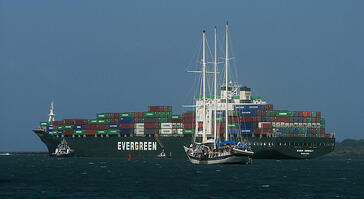Earlier this month, Jacksonville Port Authority (JAXPORT) announced its first regular liner call from Evergreen.
 Evergreen is one of the world’s largest carriers with over 180 ships by capacity of approximately 650,000 TEU (about Evergreen).
Evergreen is one of the world’s largest carriers with over 180 ships by capacity of approximately 650,000 TEU (about Evergreen).
According to the press release from JAXPORT, Evergreen’s cargo ship, The Ever Unique made its call at the TraPac Container Terminal at Dames Point of JAXPORT. The Ever Unique has a capacity of more than 5,300 TEU (twenty-foot equivalent containers).
The Ever Unique is the first cargo ship to call at JAXPORT from a new regular service that is jointly operated by Evergreen and MOL of Japan a.k.a. Mitsui O.S.K. Lines, Ltd.
The press release says this “new service expedites the movement of cargo directly from major ports in Asia… to Jacksonville and other key destinations on the U.S. East Coast.”
The major Asia ports the JAXPORT press release mentions are Vietnam, South China, and Singapore; however, the service is not limited to those ports. The service is accomplishing this ocean freight feat by taking the ships in the service through the Suez Canal.
There are 10 ships in rotation for this service. Nine of the ships are provided by MOL and the tenth is provided by Evergreen, according to the JAXPORT press release. Each of the ships has a capacity range of 4,500 to 5,600 TEU.
For international shippers, this opens up another option for importing goods from Asia to the U.S. It is also the exact kind of thing that has caused ports like the Port of Long Beach to push incentive programs to induce shippers to import their goods through them.
This service through JAXPORT is just one of the newest pieces in the port wars between the various West Coast and East Coast ports that are battling for bigger pieces of the pie in the discretional intermodal cargo market of imports to the U.S.
Discretional intermodal cargo is cargo where international shippers decide what port they ship through because the cargo is not going to a port city or area. The competition for this kind of cargo is intense.
The Suez Canal, allowing this new service for imports from Asia to the U.S. East Coast, is not the only canal that will affect the competition.
The expansion plan of the Panama Canal is supposed to be complete within a few years and double its capacity. This expansion should give international shippers the ability to choose East Coast or West Coast for certain imports without the lengthy and often expensive delays that regularly occur at the Panama Canal.
Freight rates and service are top factors for shippers making ocean cargo decisions. You can expect to see ports pushing incentives to attract discretional intermodal cargo.
